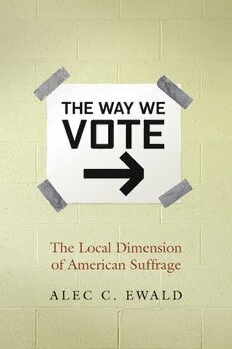
The Way We Vote: The Local Dimension of American Suffrage PDF
241 Pages·2009·1.1 MB·English
Most books are stored in the elastic cloud where traffic is expensive. For this reason, we have a limit on daily download.
Preview The Way We Vote: The Local Dimension of American Suffrage
Description:
To a degree unique among democracies, the United States has always placed responsibility for running national elections in the hands of county, city, and town officials. The Way We Vote explores the causes and consequences of America's localized voting system, explaining its historical development and its impact on American popular sovereignty and democratic equality.The book shows that local electoral variation has endured through dramatic changes in American political and constitutional structure, and that such variation is the product of a clear, repeated developmental pattern, not simple neglect or public ignorance. Legal materials, statutes and Congressional debates, state constitutional-convention proceedings, and the records of contested Congressional elections illuminate a long record of federal and state intervention in American electoral mechanics. Lawmakers have always understood that a certain level of disorder characterizes U.S. national elections, and have responded by exercising their authority over suffrage practices--but only in limited ways, effectively helping to construct our triply-governed electoral system.
See more
The list of books you might like
Most books are stored in the elastic cloud where traffic is expensive. For this reason, we have a limit on daily download.
